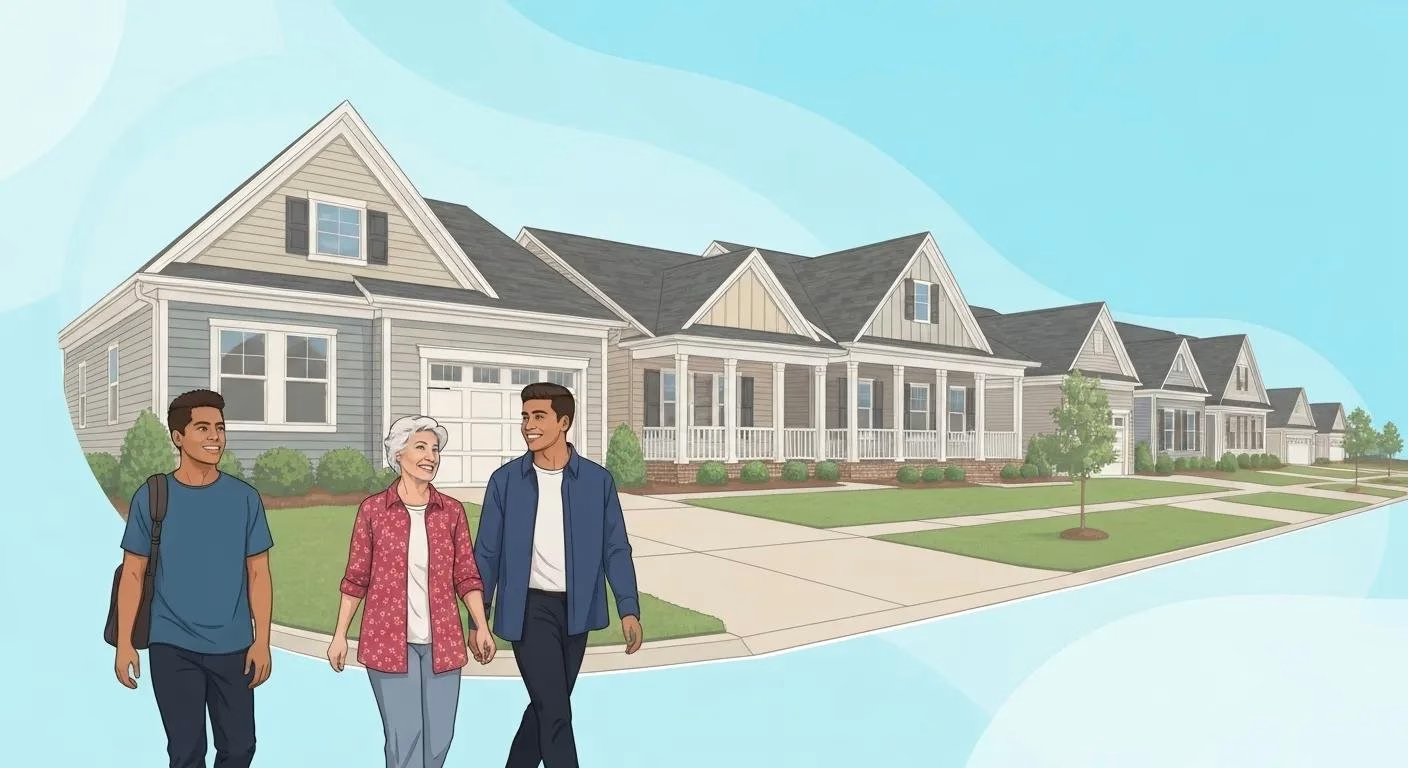Understanding the Rent to Own Process in Winston-Salem, NC

Rent To Own Homes: The Working Process In Winston-Salem NC
Unlock the door to homeownership in Winston-Salem, NC, with rent-to-own homes. This innovative approach combines a lease agreement with a future purchase option, allowing you to build equity even if your credit isn’t perfect. Dive into this guide to explore the step-by-step rent-to-own process, compare lease-option and lease-purchase agreements, and understand the key contract components. We’ll also cover legal considerations under North Carolina law and weigh the costs against traditional mortgages. Whether you’re aiming to boost your credit, secure today’s purchase price, or save for a down payment, discover how rent-to-own homes in Winston-Salem seamlessly bridge the gap between renting and buying.
What Is Rent-to-Own? Understanding Lease-Option and Lease-Purchase Agreements
Rent-to-own is a unique blend of leasing and purchasing, allowing you to live in a home under a rental contract while securing the right or obligation to buy it later. This hybrid agreement is perfect for those who need time to improve their credit or save up before getting a mortgage.
Understanding Rent-to-Own Agreements
Rent-to-own agreements merge elements of rental and purchase contracts, letting you occupy a property while working towards ownership. They’re especially beneficial if you need time to boost your credit score or save for a down payment before securing a mortgage.
This research lays the groundwork for understanding rent-to-own agreements, essential for grasping the core concepts discussed here.
What Is a Lease-Option Agreement and How Does It Work?
A lease-option agreement gives you the right-but not the obligation-to purchase the home at a set price within a specified term.
- Pay an option fee to secure exclusive purchase rights.
- Monthly rent often includes a rent credit portion that accumulates toward your future down payment.
- Before the term expires, you can exercise the option, applying credits to the purchase price.
This arrangement offers flexibility for unexpected changes, with the option fee being non-refundable yet credited at closing. This flexibility contrasts with the more binding nature of lease-purchase agreements.
What Is a Lease-Purchase Agreement and What Are Its Obligations?
A lease-purchase agreement requires you to buy the property at the end of the lease at a predetermined price.
- The option fee acts as earnest money and is credited toward closing costs.
- Monthly payments include rent credits that reduce the eventual mortgage principal.
- Failure to close results in contract default and potential forfeiture of fees.
Since a lease-purchase binds you to buy, it speeds up the path to ownership but demands careful credit readiness and clear financing plans. Understanding these obligations clarifies the core contract components below.
What Are the Key Components of Rent-to-Own Contracts in Winston-Salem?
Key Components of Rent-to-Own Contracts
Rent-to-own contracts in Winston-Salem, NC, typically include an option fee, monthly rent with a credit portion, and a predetermined purchase price. The option fee is usually non-refundable but credited at closing, while a portion of the monthly rent contributes towards the down payment.
This source clarifies the essential elements of rent-to-own contracts, directly supporting the article’s breakdown of contract components and their functions.
| Entity | Attribute | Value or Mechanism |
|---|---|---|
| Option Fee | Amount | Typically 1-3% of the agreed purchase price |
| Option Fee | Refundability | Non-refundable but credited at closing |
| Monthly Rent | Rent Credit | Portion (often 20%) applied toward down payment |
| Purchase Price | Lock-In Price | Agreed upon at contract signing |
| Lease Term | Duration | Commonly 1-3 years |
Each component secures a part of the purchase process and guides tenant-buyer responsibilities. Reviewing these elements under North Carolina law leads naturally to the detailed step-by-step process.
How Does the Rent-to-Own Process Work Step-by-Step in Winston-Salem?

Navigating rent-to-own involves distinct stages from initial search to closing. Implementing each step builds toward ownership while reinforcing credit and savings.
How Do You Find Rent-to-Own Homes and Make an Initial Inquiry?
Start by exploring local listings on real estate platforms, driving through target neighborhoods near Wake Forest University or downtown, and contacting property owners directly.
- Search “rent to own Winston Salem” in online real-estate databases.
- Contact real estate agents specializing in lease-option properties.
- Review “by-owner” ads in community boards or local classifieds.
By comparing multiple listings, you can identify homes that fit your budget and timeline, setting the stage for formal application.
What Are the Application and Approval Requirements for Rent-to-Own?
Securing approval resembles a rental application with additional purchase-readiness checks. Tenant-buyers typically submit:
- Income verification to demonstrate ability to pay rent and fees.
- Credit review highlighting current score and payment history.
- Background check ensuring no recent evictions.
- Proof of funds for the option fee and initial rent payment.
Meeting these requirements establishes the trust and financial viability needed to sign a binding rent-to-own contract, which leads directly into agreement execution.
What Happens When Signing the Agreement and Moving In?
Signing involves legal counsel review, notarization of lease and option documents, and payment of option fees plus the first month’s rent. After closing the paperwork:
- You receive keys and move in.
- The lease-to-own contract outlines maintenance duties and rent credit tracking.
- The seller or property manager files the agreement with appropriate local offices.
Fully understanding contract terms at move-in prevents future disputes and transitions smoothly into living and equity accumulation.
How Do Rent Payments Build Equity and Contribute to Purchase?
Each rent payment includes a predetermined credit portion that accrues toward the down payment.
- Example: A $1,200 monthly rent with 20% rent credit yields $240 per month in equity credit.
- Over a two-year lease, equity credits can total nearly $6,000.
- Maintenance obligations often shift to the tenant-buyer, reinforcing home care and value preservation.
Accumulating equity through rent credits both reduces the eventual mortgage and encourages responsible home stewardship before closing.
How Do You Exercise the Option to Purchase and Close the Sale?
When ready to buy, the tenant-buyer notifies the seller in writing to exercise the purchase option. The closing process then follows traditional steps:
- Secure a mortgage or alternative financing.
- Order a home inspection and address any repair negotiations.
- Pay closing costs minus accrued rent credits and option fee credit.
- Execute deed transfer, record with Forsyth County, and assume full homeownership.
Completing this final stage converts rent-to-own credits into equity and closes the gap between renting and owning.
What Are the Benefits of Rent-to-Own Homes in Winston-Salem?

Rent-to-own delivers strategic advantages for tenant-buyers who need time, credit improvement, or price protection on the Winston-Salem housing market.
How Does Rent-to-Own Provide a Pathway to Homeownership with Bad Credit or Low Down Payment?
Rent-to-own programs enable individuals with less-than-perfect credit to secure a lease while building purchase equity. By combining an option fee (often a fraction of a traditional down payment) with rent credits, tenant-buyers can demonstrate payment consistency and accumulate funds for a mortgage qualification.
How Can Rent-to-Own Help Improve Your Credit Score and Save for a Down Payment?
On-time rent payments reported through specialized reporting services bolster tenant-buyer credit history, raising scores over the lease term. Simultaneously, rent credits accumulate savings toward the final down payment, fostering financial readiness without the pressure of an immediate lump-sum deposit.
How Does Locking in a Purchase Price Protect Against Market Appreciation?
By agreeing on a fixed purchase price at contract signing, tenant-buyers shield themselves from rising home values. In Winston-Salem, where annual appreciation averages around 3%, a locked-in price ensures predictable financing and equity growth, even if the local median sale price climbs above $145,600.
Unlocking Homeownership: A Guide to Rent-to-Own in Winston-Salem, NC
Navigating rent-to-own under North Carolina law requires awareness of contract enforceability, tenant rights, and consumer protections specific to the state.
What Are the Key North Carolina Rent-to-Own Laws Affecting Tenant-Buyers?
- Written agreements comply with NC statute of frauds for contracts exceeding one year.
- Disclosure requirements are met for option fee non-refundability.
- Eviction procedures follow NC Landlord-Tenant Act if payment obligations lapse.
Consulting a licensed attorney ensures that agreements uphold state-mandated protections and enforceable terms.
How Can You Avoid Common Rent-to-Own Scams in Winston-Salem?
Protect yourself by verifying seller identity, reviewing property titles, and avoiding deals that demand large up-front fees without proper documentation. Look for these red flags:
- Unlicensed agents refusing contract review.
- Vague contract language around rent credit calculations.
- Pressure tactics to sign without attorney oversight.
Performing due diligence through public records and seeking professional counsel guards against fraudulent schemes.
How Do Rent-to-Own Costs Compare to Traditional Mortgages in Winston-Salem?
Evaluating rent-to-own versus conventional financing highlights differences in upfront fees, monthly obligations, and closing expenses.
What Are Option Fees and Rent Credits, and How Do They Affect Payments?
| Entity | Attribute | Value or Impact |
|---|---|---|
| Option Fee | Typical Amount | 1-3% of purchase price, non-refundable but credited later |
| Option Fee | Payment | One-time at contract signing |
| Rent Credit | Portion of Rent | Commonly 10-30% applied toward down payment |
| Rent Credit | Accumulation | Reduces mortgage principal at closing |
Option fees increase initial cash requirement compared to standard rent, but rent credits offset future mortgage costs and accelerate equity.
How Do Down Payment Strategies Work for Rent-to-Own Buyers?
Tenant-buyers can choose between smaller option fees with higher rent credits or larger fees with lower monthly credit portions. Conservative strategies focus on:
- Maximizing rent credit to build equity faster.
- Allocating savings to supplement option fees if additional down payment is needed.
- Seeking alternative financing like personal loans for bridging shortfalls.
Strategic allocation of funds during the lease term prepares buyers for mortgage qualification.
What Are the Typical Costs and Closing Expenses in Rent-to-Own Agreements?
Closing costs under rent-to-own align with standard real estate transactions, including: title search and insurance fees, attorney or escrow charges, recording fees with Forsyth County, property taxes and prorations. Rent credits and option fee credits lower the net amount due at closing, often making overall costs comparable to or slightly above traditional mortgage expenses.
How Can You Find and Apply for Rent-to-Own Homes in Winston-Salem?

Combining targeted searches with a clear application strategy streamlines the rent-to-own process in the Piedmont Triad.
Where Can You Find Available Rent-to-Own Properties in Winston-Salem?
- Real estate websites that filter “lease-option” or “lease-purchase.”
- Local property management firms offering rent-to-own programs.
- Community bulletin boards in Winston-Salem neighborhoods.
- Referrals from mortgage brokers who partner with lease-option providers.
Diversifying search channels widens property choices and reveals competitive terms.
What Are the Steps in the Rent-to-Own Application and Approval Process?
Applying for rent-to-own mimics rental applications with added purchase readiness checks:
- Submit proof of income and employment verification.
- Authorize a credit report to assess score and payment history.
- Pay application fees covering background and administrative costs.
- Review and negotiate contract terms with an attorney.
- Sign lease-option/purchase and remit option fee.
Completing these steps secures your position as a tenant-buyer and activates the path to ownership.
Is Rent-to-Own Right for You? Who Benefits Most from Rent-to-Own Homes in Winston-Salem?
Choosing rent-to-own depends on personal finances, credit status, and market outlook in Winston-Salem.
What Are the Pros and Cons of Rent-to-Own Homes in Winston-Salem?
- Pros
- Builds equity through rent credits.
- Provides time to improve credit.
- Locks in purchase price against appreciation.
- Cons
- Option fees are non-refundable.
- Higher monthly rents compared to standard leases.
- Binding obligations under lease-purchase agreements.
- Builds equity through rent credits.
- Provides time to improve credit.
- Locks in purchase price against appreciation.
- Option fees are non-refundable.
- Higher monthly rents compared to standard leases.
- Binding obligations under lease-purchase agreements.
Balancing these factors helps determine if the benefits outweigh the costs for your circumstances.
Which Financial and Personal Situations Make Rent-to-Own a Good Option?
Rent-to-own aligns best with individuals who:
- Have fair to poor credit needing improvement before mortgage approval.
- Lack a substantial down payment but can afford option fees and higher rent.
- Seek market price protection in a rising Winston-Salem housing market.
- Value time to make a confident purchase decision and test neighborhood fit.
Evaluating these conditions guides a confident choice on whether rent-to-own matches your homeownership goals.
Frequently Asked Questions
What Are the Benefits of Rent-to-Own Homes in Winston-Salem?
Rent-to-own homes offer several advantages, particularly for those who may struggle with traditional financing. They allow individuals to build equity through rent credits while living in the home, providing a pathway to ownership without the immediate need for a large down payment. Additionally, locking in a purchase price protects against market fluctuations, ensuring that buyers can secure a home at a predetermined cost. This arrangement also gives tenants time to improve their credit scores, making them more eligible for a mortgage when the time comes to buy.
How Do Rent Payments Build Equity Over Time?
In a rent-to-own agreement, a portion of each monthly rent payment is designated as a rent credit, which accumulates toward the eventual down payment. For example, if your monthly rent is $1,200 and 20% is credited, you would earn $240 in equity each month. Over a typical two-year lease, this could amount to nearly $6,000 in equity credits. This system not only helps tenants save for a down payment but also encourages responsible home maintenance, as they are invested in the property’s value.
What Should You Look for in a Rent-to-Own Contract?
When reviewing a rent-to-own contract, it’s crucial to ensure that it clearly outlines the terms of the option fee, monthly rent, and how rent credits are applied toward the purchase price. Look for details on the duration of the lease, maintenance responsibilities, and any penalties for not exercising the purchase option. Additionally, ensure that the contract complies with North Carolina laws regarding disclosures and tenant rights. Consulting with a real estate attorney can help clarify any complex terms and protect your interests.
How Can You Improve Your Credit Score While in a Rent-to-Own Agreement?
Improving your credit score during a rent-to-own agreement can be achieved through consistent, on-time rent payments, which may be reported to credit bureaus. This positive payment history can help raise your credit score over time. Additionally, it’s wise to manage other debts responsibly, keep credit utilization low, and avoid taking on new debt. By focusing on these areas, you can enhance your creditworthiness, making it easier to secure a mortgage when you decide to purchase the home.
What Are Common Pitfalls to Avoid in Rent-to-Own Agreements?
Common pitfalls in rent-to-own agreements include not fully understanding the terms of the contract, such as the non-refundable nature of option fees and the implications of failing to purchase the home. Additionally, some buyers may overlook the importance of conducting a thorough property inspection before signing the agreement. It’s also essential to be cautious of sellers who pressure you into signing without allowing time for review. Always seek legal advice to ensure that you are making an informed decision and protecting your investment.
How Do You Transition from Rent-to-Own to Homeownership?
Transitioning from rent-to-own to homeownership involves several key steps. First, you must notify the seller in writing of your intent to exercise the purchase option. Next, secure financing, which may involve obtaining a mortgage or other forms of financing. Conduct a home inspection to identify any necessary repairs, and negotiate these with the seller if needed. Finally, prepare for closing by paying any remaining closing costs, which may be offset by your accumulated rent credits. Completing these steps will finalize your transition to full homeownership.
How Does Rent-to-Own Work in Winston-Salem, NC?
Rent-to-own combines a rental lease with a future purchase option, allowing you to live in the home while earning rent credits and locking in a purchase price until the option term expires.
What Is the Difference Between Lease Option and Lease Purchase?
A lease-option grants the right-but not the obligation-to buy, while a lease-purchase legally binds the tenant to buy at lease end.
Can You Do Rent-to-Own with Bad Credit or No Down Payment?
Yes, many programs accept lower credit scores and require only modest option fees, using rent credits to accumulate down payment funds.
How Much Is the Typical Down Payment or Option Fee?
Option fees usually range from 1% to 3% of the purchase price, acting as a partial down payment credited at closing.
What Are the Risks and How Can You Protect Yourself?
Risks include losing non-refundable fees if you don’t close and higher rent obligations. Protect yourself by reviewing contracts with an attorney, verifying property titles, and confirming clear credit-to-equity calculations.
